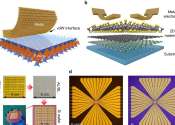In batteries, a metal reveals its dual personality
Battery researchers have been focusing on lithium metal electrodes as leading contenders for improving the amount of energy that batteries can store without increasing their weight. But lithium in this metallic form has a ...
Sep 1, 2016
0
23









